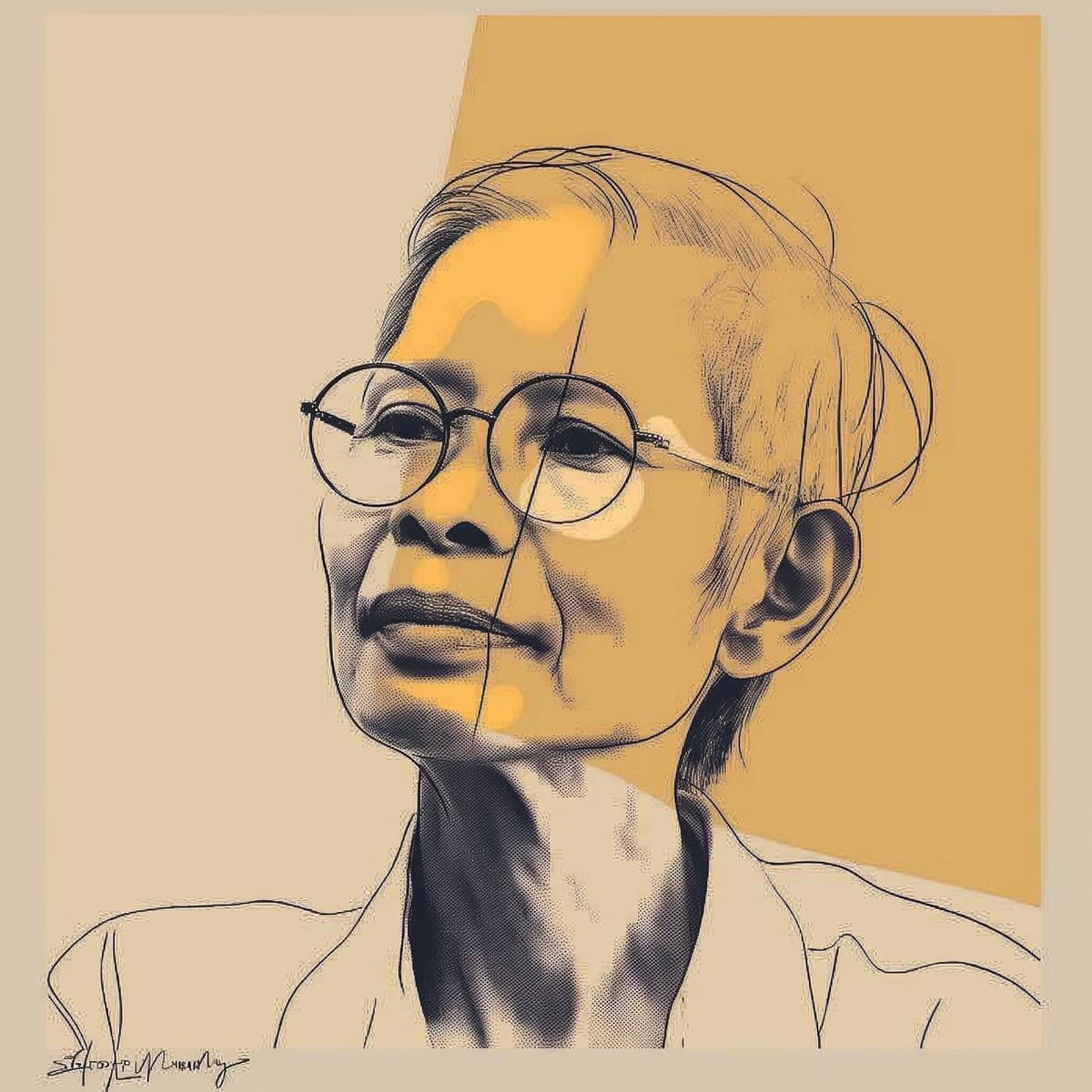
People in modern Myanmar are reconsidering an age-old question that already has an answer: "Should one pursue education or money? Which is more important - knowledge or wealth?" Why are people trying to solve a riddle that already has an answer?
Among Myanmar's social media users, the debate between pursuing education versus money is one of the most widespread discussions. Some argue that pursuing education is more important, while others view making money as the priority. The answers vary depending on one's perspective.
This raises questions like: What is education? What is money? Which one is more important? Which is more useful? These questions are particularly relevant for young people living in Myanmar, a country currently facing systemic challenges and instability.
The Nature of Knowledge
When discussing the meaning of knowledge, it's worth remembering the story of King Milinda and Nagasena. When King Milinda, who was known for intellectually tormenting scholars of Jambudvipa with his questions, met Nagasena who possessed greater wisdom than him, he asked, "What is the nature of knowledge?" Nagasena replied that the nature of knowledge is "discernment."
Here, discernment means the ability to clearly and systematically distinguish between right and wrong, good and bad, cause and effect. In simple terms, someone who possesses this ability can be considered knowledgeable.
There are different types of knowledge. There's theoretical knowledge and practical knowledge (or vocational knowledge). Moreover, the nature of knowledge is vast. Knowledge is something that can never be completely mastered. This is why they say life is a continuous learning process.
Is Formal Education Really Education?
In today's Myanmar, students attend both public and private schools. What do these schools teach?
The primary purpose of schools is to teach students "critical thinking and analytical habits" over decades. In English, this would be called Critical Thinking. Schools don't just teach this alone. They teach how to live harmoniously with the environment, how to solve academic problems independently, how to develop fundamental thinking methods when solving problems, how to research what you want to know, and how to work systematically from basics with proper timing.
Therefore, the problem isn't that academic subjects aren't practical. The problem is when students graduate without developing critical thinking skills and habits. While the original intention was good, Myanmar's education system has survived for many years on rote learning, leaving people weak in analytical thinking.
Nevertheless, it can be said that formal education primarily focuses on theoretical knowledge.
Is Technical Skill Knowledge?
When we say formal education prioritizes theoretical knowledge, one might ask if it's possible to prioritize technical skills instead. It is possible, and there are schools that do this.
For example, there are vocational training courses and schools in Myanmar, as well as GTI universities. These teach technical skills.
If you learn carpentry at a vocational school, you'll be able to make chairs, tables, and furniture after graduation. If you study Civil Engineering, you'll be able to build houses, bridges, and buildings as a civil engineer after graduation. These were traditionally called vocational training schools. Singapore's polytechnics teach such vocational subjects. In fact, Singapore's polytechnics were modeled after Myanmar's RIT.
Another aspect is technical expertise. There's a tendency to become skilled at something when you repeat it often. This is why they say it takes 10,000 hours of study to master a field and reach a professional level.
For example, imagine the scene of workers repeatedly sewing garments in a textile factory. They are highly skilled factory workers who have mastered the art of sewing. They have both knowledge and expertise in sewing.
Thus, if someone spends time editing videos, repairing machines, flying planes, or driving trains, they will naturally become skilled. These are all technical skills. Whatever the field, this kind of training leads to expertise.
Comparing Theoretical and Technical Knowledge
Theoretical knowledge teaches thinking, while technical knowledge teaches skills. While theoretical knowledge might be harder to apply immediately, technical knowledge can be put to use right away once mastered. So which is more important?
It's more difficult to become a person with theoretical knowledge than someone with technical skills. For business owners too, it's harder to find managers who can think critically and solve problems than to find employees with specific skills. It's more challenging to find someone who can manage an entire garment factory than to find a skilled garment worker.
This is why those with theoretical knowledge, who can solve problems and think logically, tend to become leaders.
A person needs at least one technical skill for a decent livelihood in their life. With that skill mastered, along with critical thinking ability, logical reasoning, and the theoretical knowledge to analyze many things objectively, their life will advance to the next level.
Therefore, technical skills are necessary for normal life. But for jobs that benefit society and major enterprises, theoretical knowledge is essential.
Regardless, both theoretical scholars and technical experts should remember that they are contributing to the world in their own capable ways.

Win Big Prizes with ShweNote
No time to read, or overwhelmed by too many book choices? Want to read famous books in a short time - whether you're in the car, at a coffee shop, or at home - with both text AND audio?
ShweNote offers summaries of famous books and Audio Books that you can listen to while walking or doing other tasks. Whether you prefer reading Book Summaries or listening to Audio Books, we have you covered. A Digital Library accessible anytime, anywhere...
Start reading one article a day with ShweNote to make the biggest changes in your life in 2025. Subscribe this December and you'll also get a chance to win prizes worth 20 million kyats!
ShweNote - your one-stop source for knowledge... the fountain of intellectual resources
Does Formal Education Relate to Earning Potential?
The answer to this question is difficult to state definitively.
There are people who reach the top without formal education, just as there are educated people, even Ph.D. holders, who are unemployed and without income. Similarly, there are many jobs in the world that require formal education, and it's a fact that people without formal education can't even approach such positions.
Let's consider Myanmar's situation. For individual livelihood, one can potentially be self-sufficient without formal education. For example, if you sell fried snacks with good market presence, reasonable prices, and good customer service, you don't need any formal education. You can potentially sustain your life with just the technical skill of making and selling fried snacks.
However, let's say you want to earn more than selling fried snacks. Say you want to break into the European market with one of your products. You'll need to consider market analysis, domestic and international laws, market conditions, pricing, raw material sourcing, and distribution channels - all of which require expert consultation. This isn't as simple as selling fried snacks. This is where formal education becomes necessary. Even without formal education, you would need advice from educated experts to accomplish such tasks.
Similarly, if you want to earn money as a doctor or save lives, you can't do without formal education. Ultimately, if you want to work at places like NASA, UN, or Microsoft, you'll need formal education.
So globally, one can say formal education correlates with earning potential. In Myanmar, however, because the country cannot provide jobs to graduates, the correlation between formal education and earning potential might not be direct. This is why the answer to whether formal education relates to earning ability is difficult to state definitively.
However, it's generally accepted that with formal education, earning money becomes more convenient and finding employment becomes easier. This is a practical truth.
For example, consider who would be preferred when an Oxford Business School graduate and a Myanmar business graduate apply for the same job. Even this comparison is between two degree holders - if you were an employer, who would you hire between someone with a degree and someone without? You can think about it this way.
In summary, for individual sustenance, you might manage even by chopping firewood for a living. But for significant jobs, formal education is important. You can earn money without formal education, but with formal education, you can earn money more conveniently.
Education or Money?
Sometimes when life forces you to choose between two things, the decision becomes difficult. For example, if someone offered ten million kyats for one of your eyes, which eye would you sell - left or right?
Similarly, when asked to choose between education and money, one might ask back - why can't we have both?
This is because in life, both education and money are important. Just as you can't study without money, it's extremely difficult to earn money without education.
At minimum, you need to master some technical skill - what we call a money-making skill.
Then you need the knowledge to analyze situations objectively and critically. Once you have both a money-making skill and the ability to solve problems and analyze situations critically, earning money becomes easier.
We discussed earlier that the fundamental nature of knowledge is discernment. When one develops the wisdom to discern between cause and effect, good and bad, they can live properly as a human being. Knowledge helps decide what's important for the human environment and what isn't, whether to earn ethically or by causing others' tears, whether to earn by destroying the environment, whether your business will advance or decline your country, race, and society.
Therefore, if we want to build a proper and good human society, knowledge is truly necessary. As for technical skills, robots and AI are ready to replace you in your position.
In fact, the question of whether education or money is more important is a riddle that previous generations have already solved.
Humans invented the "wheel" to reach their destinations many years ago. Humans don't need to reinvent the "wheel" from scratch anymore. There's no need to prove that the "wheel" can rotate. Similarly, there's no need to prove that knowledge is more valuable than anything else.
If a society still needs to prove this, that society must be quite backward.
Finally, it's not just about worldly matters. Even in spiritual matters, for Buddhists, knowledge is everything. It's worth highlighting that even to reach Nirvana, the ultimate goal for Buddhists, one cannot arrive without knowledge.
Han Thit Ein (Y3A)
Read More:
 Build Myanmar - MediaY3A
Build Myanmar - MediaY3A
 Build Myanmar - MediaBuild Myanmar Staff
Build Myanmar - MediaBuild Myanmar Staff
Build Myanmar-Media : Insights | Empowering Myanmar Youth, Culture, and Innovation
Build Myanmar-Media Insights brings you in-depth articles that cover the intersection of Myanmar’s rich culture, youth empowerment, and the latest developments in technology and business.
Sign up for Build Myanmar - Media
Myanmar's leading Media Brand focusing on rebuilding Myanmar. We cover emerging tech, youth development and market insights.
No spam. Unsubscribe anytime.
Sign up now to get the latest insights directly to your mailbox from the Myanmar's No.1 Tech and Business media source.
📅 New content every week, featuring stories that connect Myanmar’s heritage with its future.
📰 Explore more:
- Website: https://www.buildmyanmarmedia.com/
- Facebook: https://www.facebook.com/buildmyanmar
- YouTube: https://youtube.com/@buildmyanmarmedia
- Telegram: https://t.me/+6_0G6CLwrwMwZTIx
- Inquiry: [email protected]
#MyanmarUpdates #MyanmarNews #BuildMyanmarMedia #Myanmarliterature #myanmararticle #Updates #Insights
